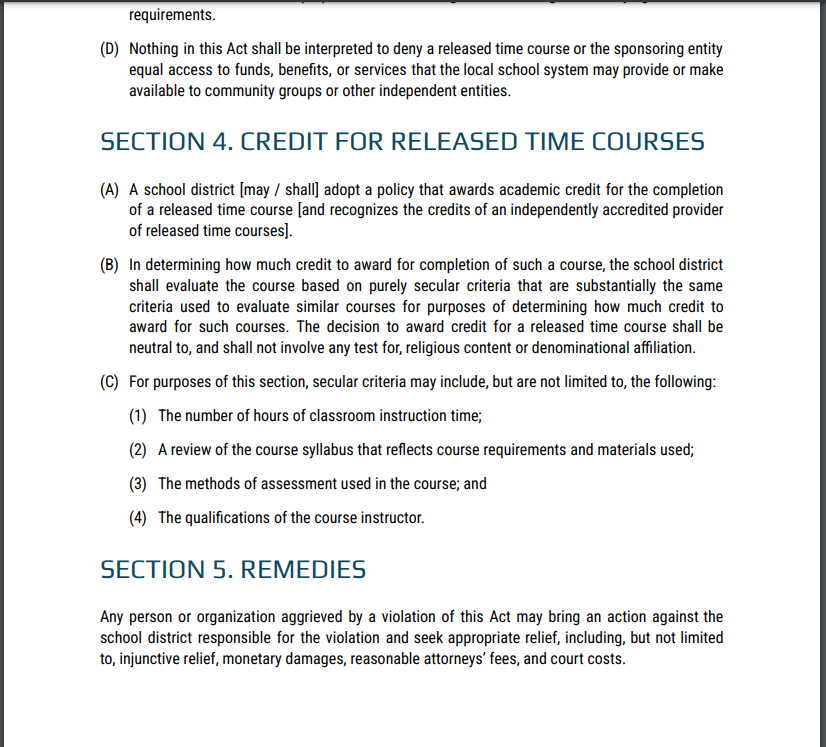COLUMBUS, Ohio (WCMH) — A national Christian advocacy group that supports letting students leave school grounds for religious instruction now is pushing for allowing the Ten Commandments to be posted in classrooms across Ohio.
An NBC4 analysis found several ties between Ohio politicians and the legislative priorities of the National Association of Christian Lawmakers. The NACL, identified by Project 2025 as one of its 114 advisory members, lists its mission as bringing Christian lawmakers together in support of biblical principles, which it does by discussing model legislation. In December, members saw presentations about the Ten Commandments and religious release time.
Ohio lawmakers are considering Senate Bill 34, a bill that would require classrooms to post one of multiple historical documents, a list that includes the Ten Commandments. It had its first hearing on Tuesday.
The Supreme Court first ruled decades ago that posting the Ten Commandments on public school or government property would violate the separation of church and state, and federal courts have consistently upheld this decision.
“This bill is part of a national effort by religious conservatives to tear down the wall separating church and state created by the Establishment Clause in the U.S. Constitution,” Ohio Senate Democratic Leader Nickie Antonio said.
“This is simply one of several historical documents referenced as options in the bill,” Ohio Senate Republicans spokesperson John Fortney said. “It’s important to remember that whether it is the Declaration of Independence, The Bill of Rights, or the Ten Commandments, the founding fathers weren’t against religion in government, they were against a government religion and none of these options establishes a government religion.”
In Ohio’s bill, the list of historical documents also includes:
- The Mayflower Compact
- The Declaration of Independence
- The Northwest Ordinance
- The mottoes of the U.S. and the state of Ohio
- The Magna Carta
- The Bill of Rights
- The U.S. Constitution
- The Articles of Confederation
The NACL sample bill was not published online, so NBC4 was unable to compare it directly with S.B. 34.
The state NACL vice chair is a member of Ohio’s General Assembly, Rep. Gary Click (R-Vickery), and the state chair is Ohio Treasurer Robert Sprague. Sprague recently announced he will not run for governor in 2026, seemingly in anticipation of a run by businessman Vivek Ramaswamy. Sprague is now seeking the Secretary of State office, and he attended the December presentations.
The historical documents bill comes after Ohio approved a law requiring public schools to enact release policies for religious instruction during the school day off school property. Those efforts are most visibly seen in central Ohio through LifeWise, which is headquartered in Hilliard and has launched programs in multiple districts.
At the December meeting, a LifeWise representative presented about the importance of release time for religious instruction and how states should ensure their laws about release time say districts “shall” implement release policies, rather than districts “may.” At the end of his presentation, he provided a sample bill for legislators to implement.
At the time of the presentation, Ohio had “may implement” language on the books. Within a week of the NACL presentation, Ohio passed its RTRI new law. Much of Ohio’s law mirrors the draft legislation in LifeWise’ presentation, with several lines repeated verbatim. See previous coverage of this legislation in the video player above.


“Like many nonprofits, we do engage in lobbying activities in accordance with the legally allowable time,” LifeWise founder and CEO Joel Penton said. “Some members of our staff also provide education materials about legislation that is aligned with our mission.”
In the first hearing for the historical documents bill, sponsor Terry Johnson (R-McDermott) said it was “inexcusable” they did not receive enough attention in classrooms. He also said the legislation ensured no public funds were required to pay for the costs of hanging the documents. Johnson said although public funds could be used, it also allowed for donations to cover costs.
“Simply put, this legislation intends to reintroduce disciplined historic principles — those same principles upon which our Founding Fathers drew inspiration and put to writing — back to the classroom,” Johnson said.
Other senators voiced concerns about the cost and whether it was appropriate to include a religious document. Sen. Catherine Ingram (D-Cincinnati) asked why the Ten Commandments were present, to which Johnson said they were foundational to the nation. Johnson also said the bill was not about the Ten Commandments, just about central historical documents.
Nik Nartowicz, lead policy council for Americans United for Separation of Church and State, disagreed with Johnson. He said there was not a clear educational purpose in posting the Ten Commandments and reiterated that lawmakers are not allowed to impose their religious beliefs on constituents.
He also said the Ten Commandments are a sacred text for people of faith across multiple religions and argued putting up printouts of the text could be disrespectful.
“I think this is being pushed as a way to honor religion, but it trivializes a sacred text,” Nartowicz said.
Further hearings for the bill are not yet scheduled.










